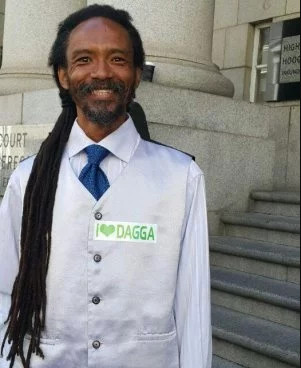When Deputy Chief Justice Raymond Zondo handed down the Constitutional Court’s decision to decriminalise the personal and private use of cannabis, Gareth Prince was seated in the front row.
As Zondo ordered the state to pay the costs of Gareth’s legal fees, he cheered in celebration alongside his Rastafari friends and supporters. It was a moment of vindication and victory for the 20 years long battle. “The journey came full circle nearly two decades later. The harder the battle, the sweeter the victory,” says Gareth.
The Journey
Gareth’s legal fight against the criminalisation of cannabis started in 1998 when he was refused admission as an attorney by the Cape Law Society because of his criminal record for possession of cannabis.
The decision by the Cape Law Society inspired him to fight “unfair discrimination” against the herb and the people who share his Rastafari faith. Gareth began his battle with the law when he was a second-year law student in 1989 in Cape Town after he was arrested for possession of cannabis in the street outside his Kraaifontein home. “I was arrested in my 2nd year at university and have been arrested a couples of times after that. The Rastafari way of life taught me from an early age thru reggae that the laws against ganja are unfair and unjust,” adds Gareth.
Cannibas, religion and law
“I appeared in the Bellville magistrate’s court. The words I remember clearest are those of the magistrate when sentencing me ‘Don’t come and tell the court about laws of the Bible.’ My question was ‘How could the law ignore the Bible if they ask you to swear on the Bible and God?”
“When I approached the court in 1998 I realized that asking South African society at that time to free up cannabis was unrealistic because we were a very intolerant society at the time. I was concerned about my ability to work as an attorney, so I limited my case to the religious aspect. The thinking was that because this is our sacrament, the law would make an exception for us. I also argued that my religious usage of cannabis did not inhibit my ability to be a legal professional.”
Again In 2002, Gareth approached the Constitutional Court to argue that possession and use of the herb was his religious right. But he soldiered on and placed his hope on changing times and his conviction to “fight the system” on behalf of the Rastafari.
His next move
Gareth says his journey is far from complete. “Next step is holding government to account and ensuring that cannabis start working towards the economic emancipation of South Africa. Destigmatising the image of cannabis and changing the conversation away from recreation to economics and empowerment,” concludes Gareth.
Practicising law
As for his personal ambitions, Gareth says he will approach the Law Society to finally fulfil his dream of practicing law. “The Cape of Good Hope Law Society refused to designate me fit and proper because I stated that I defied the law. That has now fallen away so there is no excuse now. The Cape Law Society has ever since refused to honour the Constitution of RSA and its laws, by refusing to reasonably accommodate me in the fraternity even though Justice Sachs in his judgment recognized that I acted on principle and with dignity.”
Credit: www.news24.com

